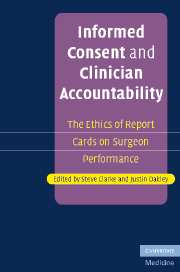Book contents
- Frontmatter
- Contents
- List of contributors
- Acknowledgements
- Introduction: Accountability, informed consent and clinician performance information
- Part I Accountability
- Part introduction
- 1 Clinician report cards and the limits of evidence-based patient choice
- 2 Report cards for institutions, not individuals
- 3 Safety, accountability, and ‘choice’ after the Bristol Inquiry
- 4 Public reports: putting patients in the picture requires a new relationship between doctors and patients
- 5 Adverse event disclosure: benefits and drawbacks for patients and clinicians
- 6 Report cards and performance monitoring
- Part II Informed consent
- Part III Reporting performance information
- Index
- References
1 - Clinician report cards and the limits of evidence-based patient choice
Published online by Cambridge University Press: 08 August 2009
- Frontmatter
- Contents
- List of contributors
- Acknowledgements
- Introduction: Accountability, informed consent and clinician performance information
- Part I Accountability
- Part introduction
- 1 Clinician report cards and the limits of evidence-based patient choice
- 2 Report cards for institutions, not individuals
- 3 Safety, accountability, and ‘choice’ after the Bristol Inquiry
- 4 Public reports: putting patients in the picture requires a new relationship between doctors and patients
- 5 Adverse event disclosure: benefits and drawbacks for patients and clinicians
- 6 Report cards and performance monitoring
- Part II Informed consent
- Part III Reporting performance information
- Index
- References
Summary
Evidence-based patient choice
The concept of ‘evidence-based patient choice’ brings together two developments of ethical importance in contemporary medicine: evidence-based medicine and the growth of patient-centredness (Parker, 2001). The concept of evidence-based medicine, whilst problematic in many respects, encapsulates the belief that decision-making in medicine should be justified on the basis of good-quality evidence for the effectiveness of the intervention rather than on the basis of tradition, established models of practice, clinician preference and authority or other grounds. Patient-centred medicine too has arisen out of a concern with, and a critical response to, traditional medical practice and in particular to its over-emphasis on the authority of the health care professional. To some extent, this latter development has been driven by broader social changes outside medicine including a greater willingness to challenge the decisions of professionals including those of health professionals and to require such decisions to be both accountable and transparent. It is also related to relatively rapid developments in medical science and technology, which have created, along with social changes, an ever-increasing range of ethical questions with regard to which patient values vary significantly. Thirdly, and related to the other two, the move to patient centredness, and indeed to evidence-based medicine, has also been driven by increased media attention on developments in medical technology and by public and media discussion of scandals in medicine and in medical research.
- Type
- Chapter
- Information
- Informed Consent and Clinician AccountabilityThe Ethics of Report Cards on Surgeon Performance, pp. 27 - 40Publisher: Cambridge University PressPrint publication year: 2007



